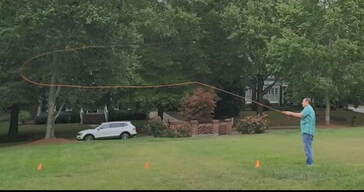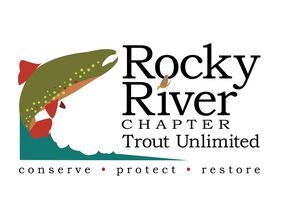 Setup with Cones, and Yarn Fly. Setup with Cones, and Yarn Fly. Practice can seem silly to many anglers. I know my neighbors think I’m a little nuts after the practice onslaught I unleashed on the local green space last summer. What my neighbors and many anglers don’t know is that practice makes your days on the water more enjoyable and casting is fun. Practice develops confidence in making “that cast,” and develops skills that become second nature on the water. In the absence of wild weather, casting is one of the few things we can really control in fishing. Casting is a fundamental skill in fly-fishing, as fundamental as tying knots, wading*, hooking, fighting and landing a fish. You learn and improve these skills with practice. Because skills are perishable, you also maintain them with practice. Here are six tips to improve your casting and practice sessions: Plan – What am I practicing? If you don’t know what you are working on, you’ll make little improvement or develop new skills. Randomly casting is fun, but it doesn’t improve your skill set. I like to warm-up with a few pick-up and lay down casts out to 30’ and ensure I have good loops forward and back. Then I begin practicing the cast(s) I want to work on. Could be a session of reach casts or slack line casts, accuracy casts or a simple overhead cast tune-up, but have a plan. Setup – Having a ready-to-go practice kit containing rod/reel/leader, yarn or fly with clipped point, and the tools you need makes setup more efficient. I like enough room to cast 50 feet of line and leader, over a relatively flat surface. Most of my casting is inside this distance, but it gives you a little space. If I’m working on distance the course gets bigger. Bring a measuring tape, and some soccer cones. Mark off a course and use the cones for distance and accuracy targets. Do it the same way every time and adjust for wind direction. Practice in tough weather, we don’t always get wind-free days. Pick A Target – For accuracy casting this is obvious, but in all casts you perform, pick a target for your “presentation cast” – the cast that would land on the water. Keep a Log – Especially if you are working on a new skill or trying to add distance. Record what’s working and not working. For distance casting, record the length of cast you can execute without issue. A log will help you see progress and enable you to pick up where you left off. Repeat Success – We learn by repetition. Unfortunately, repeating a bad cast locks in bad performance just a solidly as repeating good casts improve performance. Repeating mistakes, trains yourself to repeat them. Some excellent friends taught me this technique for when you make a bad cast:
Frequency & Duration – Don’t overdo this. Unless you are really working on a new skill, you need in a hurry, 2-4 days per week, of no more than 30-45 minutes per session is plenty. Focus on quality, not quantity. Otherwise you will tire yourself, make bad casts and begin repeating mistakes. Casting is fun, and the more you learn, the more fun it becomes. Some excellent casting resources can be found at Fly Fishers International. *For those of you who don’t think wading is a skill, consider the times you’ve busted fish, or your butt, and know stealth or better balance was your failing.
3 Comments
|
Brian EsqueAs a leader in RRTU and a member of Fly Fishers International, Brian believes fishing is a gateway to conservation and knows that Archives
April 2023
Categories |
- Rocky River TU
- FORR
- Programs
-
Resources
-
Fly of the Month Patterns
>
-
DRY FLY PATTERNS
>
- Adams Variant
- Asher
- Baigent's Variant
- Blue Quill
- BWO
- BWO Catskill
- BWO CDC Emerger
- BWO Sparkle Dun
- BWO Spinner
- Carolina Wulff
- CDC Biot Comparadun
- CDL Comparadun
- Coachman Variant
- Crackleback
- Dragonfly Dry
- Dry Pheasant Tail Variant
- Dun Fly, August Fly,Wasp Fly
- Early Nelson
- Egg Laying Caddis
- Troth Elk Hair Caddis FFI
- Elk Hair Caddis
- EZ Caddis
- Female Adams
- Fluttering Caddis
- Ginger Quill
- Gray Fox Variant
- Griffith's Gnat
- Hazel Creek
- H & L Variant
- Hopper Juan
- Infallible
- Japanese Beetle
- Jassid
- Jim Charley
- Klinkhamer
- Lacewing
- Light Cahill Catskill
- Little Green and Little Yellow Stonefly
- Mr. Rapidan
- North Carolina Yellow Sally
- FFI Parachute Adams
- Parachute Adams
- Puff Diddy
- October Caddis
- Orange Forked Tail
- Rattler
- Red Headed Caddis
- Smoky Mountian Candy
- Sunkist
- Trude
- Rusty Spinner
- Sulphurs Part 1
- Sulphur Part 2
- Yellow Palmer
- Dry Attractor
- Midges >
-
Nymphs
>
- Brassie
- Chironimid
- Copper John
- Crossover Nymph
- Crow Fly
- Damsel Fly Nymph
- Deep Sparkle Caddis Pupa
- Devil's Doorstop
- Girdle Bug
- Gold Ribbed Hare's Ear
- Hare's Ear Nymph FFI
- Hot Creek Special
- Mr. Rapidan
- Peridgon Nymph
- BH Prince Nymph FFI
- BH Prince Nymph
- Realistic Stonefly
- Royal Prince
- Scud
- Egan's Tasmanian Devil
- Tups Indespensible
- Pupae/Larva
- Scud >
- Soft Hackles >
- Terrestrials >
- Wet Fly Patterns >
-
DRY FLY PATTERNS
>
- Fly Patterns
- RRTU Class Recipes
- NC General Hatch Charts
- Fly Shops, Outfitters and Guides
- Fly Fishing >
- Fly Casting
- History, Reading, References >
- Calendar Copy
-
Fly of the Month Patterns
>
- RRTU Store
- Rocky River TU
- FORR
- Programs
-
Resources
-
Fly of the Month Patterns
>
-
DRY FLY PATTERNS
>
- Adams Variant
- Asher
- Baigent's Variant
- Blue Quill
- BWO
- BWO Catskill
- BWO CDC Emerger
- BWO Sparkle Dun
- BWO Spinner
- Carolina Wulff
- CDC Biot Comparadun
- CDL Comparadun
- Coachman Variant
- Crackleback
- Dragonfly Dry
- Dry Pheasant Tail Variant
- Dun Fly, August Fly,Wasp Fly
- Early Nelson
- Egg Laying Caddis
- Troth Elk Hair Caddis FFI
- Elk Hair Caddis
- EZ Caddis
- Female Adams
- Fluttering Caddis
- Ginger Quill
- Gray Fox Variant
- Griffith's Gnat
- Hazel Creek
- H & L Variant
- Hopper Juan
- Infallible
- Japanese Beetle
- Jassid
- Jim Charley
- Klinkhamer
- Lacewing
- Light Cahill Catskill
- Little Green and Little Yellow Stonefly
- Mr. Rapidan
- North Carolina Yellow Sally
- FFI Parachute Adams
- Parachute Adams
- Puff Diddy
- October Caddis
- Orange Forked Tail
- Rattler
- Red Headed Caddis
- Smoky Mountian Candy
- Sunkist
- Trude
- Rusty Spinner
- Sulphurs Part 1
- Sulphur Part 2
- Yellow Palmer
- Dry Attractor
- Midges >
-
Nymphs
>
- Brassie
- Chironimid
- Copper John
- Crossover Nymph
- Crow Fly
- Damsel Fly Nymph
- Deep Sparkle Caddis Pupa
- Devil's Doorstop
- Girdle Bug
- Gold Ribbed Hare's Ear
- Hare's Ear Nymph FFI
- Hot Creek Special
- Mr. Rapidan
- Peridgon Nymph
- BH Prince Nymph FFI
- BH Prince Nymph
- Realistic Stonefly
- Royal Prince
- Scud
- Egan's Tasmanian Devil
- Tups Indespensible
- Pupae/Larva
- Scud >
- Soft Hackles >
- Terrestrials >
- Wet Fly Patterns >
-
DRY FLY PATTERNS
>
- Fly Patterns
- RRTU Class Recipes
- NC General Hatch Charts
- Fly Shops, Outfitters and Guides
- Fly Fishing >
- Fly Casting
- History, Reading, References >
- Calendar Copy
-
Fly of the Month Patterns
>
- RRTU Store

 RSS Feed
RSS Feed